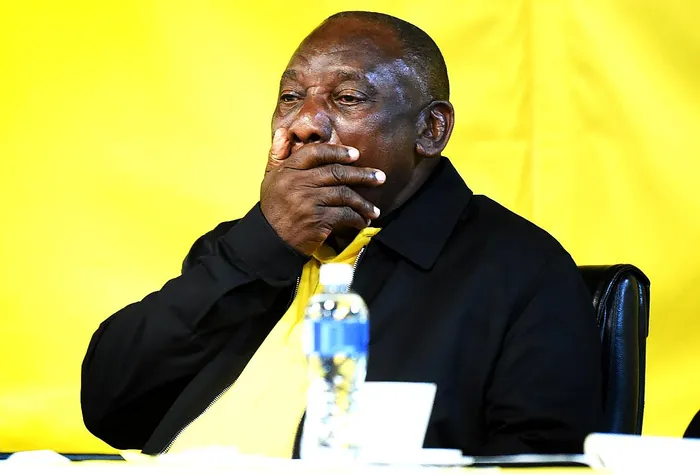Ramaphosa's advisor denies resignation rumours ahead of G20 Summit

President Cyril Ramaphosa is rumoured to be planning to resign as SA president after the G20 Heads of State Summit.
Image: Itumeleng English / Independent Newspapers
President Cyril Ramaphosa's long-time advisor and Special Envoy, Bejani Chauke, has vehemently dismissed "disturbing and unfounded rumours" suggesting the president would step down shortly after the upcoming G20 Heads of State Summit in Johannesburg.
Chauke's defence comes amid swirling speculation and reports of internal pressure within the ANC for Ramaphosa to relinquish his office, fuelled by a flurry of allegations.
Reports earlier this month indicated that Ramaphosa intended to resign following the high-profile event, a narrative Chauke has firmly refuted.
"This rumour is devoid of truth and aims to cast aspersions on the successful build-up of the first-ever G20 Summit on the African continent, with the sustainability and solidarity theme," Chauke declared.
Sources within the ANC's National Executive Committee (NEC) had previously revealed a push from some members for Ramaphosa's departure, particularly after a series of allegations began to surface.
His comments, suggesting ANC councillors should emulate DA councillors in the Western Cape for effective municipal governance, have also ignited anger among ANC members.
"It is even suggested that some do not want him to deliver the upcoming January 8 Statement…Some comrades have voiced this in secret meetings during regional conferences of the ANC," a source said.
Chauke said: "President Ramaphosa’s international track record, undergirded by a national mandate to govern, is unquestionable.
"The South African constitutional framework permits a president to serve a maximum of two terms. President Ramaphosa completed his first term and was re-elected by Parliament, a democratic institution representing the people’s will, to serve a second term.
"If there is a moment, the president may consider shortening the term he has been mandated to complete; it will be when the parties represented in Parliament decide. Until then, he is well within my South African mandate."
He condemned the "irresponsible" peddling of narratives that suggest the president would act contrary to his mandate and the constitutional order.
"It should be stated unequivocally that the President of South Africa is not resigning. The administration remains stable and focused on delivering for the people of South Africa, our alliance, and our economic partners," Chauke said.
However, the calls for Ramaphosa's resignation are not merely rooted in political manoeuvring but are also intricately linked to several controversies that have shadowed his presidency.
Among these are recent allegations concerning his association with Hangwani Maumela, a man linked to the alleged R2 billion looted from Tembisa Hospital.
Photos and a video from 2023 showing Ramaphosa engaging in a friendly photo opportunity at Maumela’s lavish Sandton home, which was recently confiscated by the Special Investigating Unit (SIU), have fuelled widespread speculation and public anger.
The SIU revealed Maumela as the alleged head of a syndicate that siphoned almost R900 million from the hospital through fraudulent procurement orders, leading many to question the president's connections.
Another shadow cast over Ramaphosa's tenure is the infamous 2022 Phala Phala scandal.
This involved allegations by former spy chief Arthur Fraser that large sums of foreign currency were stashed in a sofa on Ramaphosa's game farm and subsequently stolen, with an alleged cover-up following.
Fraser claimed that Chauke himself brought "large sums" of US dollars from various countries and hid them in a couch before transporting them to the president's farm.
This scandal, which saw "speculated" amounts between $4 million and $8 million stolen, had previously pushed Ramaphosa to consider resigning before the ANC's 2022 elective conference, a decision he was reportedly convinced to reverse by figures like Gwede Mantashe, as confirmed by ANC Secretary-General Fikile Mbalula.
Presidency spokesperson Vincent Magwenya and ANC spokesperson Mahlengi Bhengu-Motsiri had not responded to requests for comment by the time of publication.
Chauke’s statement follows Ramaphosa’s strategic retreat with leaders of the 10 political parties forming the Government of National Unity (GNU) earlier this week, which sources within the GNU said there were no discussions of Ramaphosa stepping down.
Political analyst Dr John Molepo said Chauke's forceful denial of Ramaphosa's impending resignation served multiple purposes.
"Firstly, it aims to quell internal dissent and project an image of stability within the ANC and the broader GNU. The repeated surfacing of resignation rumours, particularly after high-profile events like the G20, suggests a persistent undercurrent of dissatisfaction within certain factions of the ruling party.
"Secondly, Chauke's statement seeks to insulate Ramaphosa from the growing pressure stemming from recent corruption allegations, particularly the Maumela links and the enduring impact of the Phala Phala scandal. By framing these as mere 'rumours' or 'aspersions', the Presidency attempts to delegitimise the criticisms and portray them as politically motivated attacks,” Molepo said.
mashudu.sadike@inl.co.za
Related Topics: